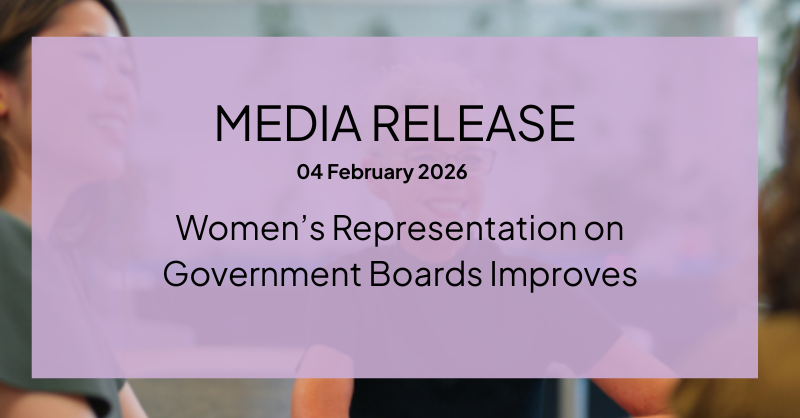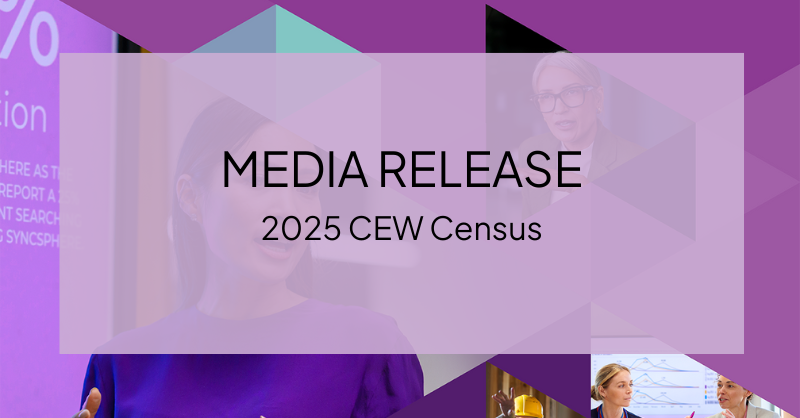Federal Government reports on menopause and ECEC pave way to unlock women's workforce participation

MEDIA RELEASE: CEW WELCOMES FEDERAL GOVERNMENT REPORTS ON MENOPAUSE AND ECEC TO UNLOCK WOMEN’S WORKFORCE PARTICIPATION
Chief Executive Women (CEW) has welcomed two Federal Government reports aimed at addressing issues facing women to drive social and economic prosperity.
On Wednesday, the findings of the Senate inquiry into issues related to menopause and perimenopause were released, while the Productivity Commission handed down its final report into Early Childhood Education and Care (ECEC).
Both reports demonstrate increasing government commitment to key policy areas for which CEW has advocated over many years.
CEW president Susan Lloyd-Hurwitz said many women faced significant challenges during both early parenthood and midlife, which can lead to disruptions in their careers and workforce participation.
“The Australia Institute found women’s labour force participation, which matches male participation until the late 20s, drops off sharply during prime parenting years, and not always willingly. This happens again in midlife, when ABS data tells us women are retiring 12 years earlier than they want to,” she said.
“These reports call for universal access to quality ECEC, and better menopause awareness and services – two things that would unlock women’s workforce participation throughout the course of their lives.”
Response to the Senate inquiry findings
CEW welcomed the Senate’s recommendations addressing menopause and perimenopause, affirming the critical need for workplace, healthcare, and legislative reforms to support Australian women through these life stages.
In a submission to the inquiry, CEW called for more investment into women’s health, with an explicit – but not exclusive – focus on peri-/menopause. It said the research must employ an intersectional, life-course approach, recognising the socio-economic impacts of women’s health for women and the wider community.
In addition to research and investment, the report aligned with shared policy recommendations, such as:
- Integrating gender considerations into healthcare policies and budgets
- Ensuring affordable and universal access to menopause treatments and care
- Prioritising flexible working conditions for gender-inclusive reproductive leave
- Increasing awareness and training in workplaces
“On average, women in Australia retire at 52 years old. That is seven years before the average age for men, and 12 years before women's desired age of retirement. 45 per cent of women retiring early cite their health as the primary reason,” Ms Lloyd-Hurwitz said.
“Women are leaving the workforce, often at the peak of their career. We know from the CEW Senior Executive Census released this week that 70 per cent of Executive leadership roles are still held by men and 91 per cent of CEOs in the ASX300 are men.
"Clearly, women’s health and economic participation are inextricably linked. Increased awareness, better workplace policies, and enhanced healthcare provisions will not only improve the well-being of women but also their economic security, particularly as they remain active in the workforce.”
CEW’s submission to the Senate Inquiry on issues related to menopause and perimenopause can be viewed here.
Response to the Productivity Commission final report on ECEC
CEW supports the Productivity Commission’s position that addressing affordability barriers should be a priority for ECEC reform. CEW has long endorsed the commission’s recommendation that government deliver universal access to 30 hours a week of high-quality ECEC by 2036.
The final report supports other priority areas for which CEW advocates, including:
- Abolishment of the Child Care Subsidy Activity Test
- Investment in a thriving ECEC workforce
- Expanding access to ECEC in remote, regional and rural areas, including Aboriginal community-controlled services
“Increasing the workforce participation of women is the single biggest economic lever we have to improve our economy for the good of all. Yet, access to affordable, quality early childhood education remains a significant barrier,” Ms Lloyd-Hurwitz said.
“This report speaks to the significant progress that’s been made to elevate ECEC as a national issue, with a willingness to address needed reforms. The provision of more affordable and accessible ECEC by 2036, starting by addressing Australia’s childcare deserts by 2030, is critical and we call on government to make it happen.”
CEW’s submission to the Productivity Commission Inquiry into Early Childhood Education and Care can be viewed here.
ENDS
Media Contact:
Jesse McCarthy-Price
E: jesse@cew.org.au
M: +61 429 160 550
From the blog


